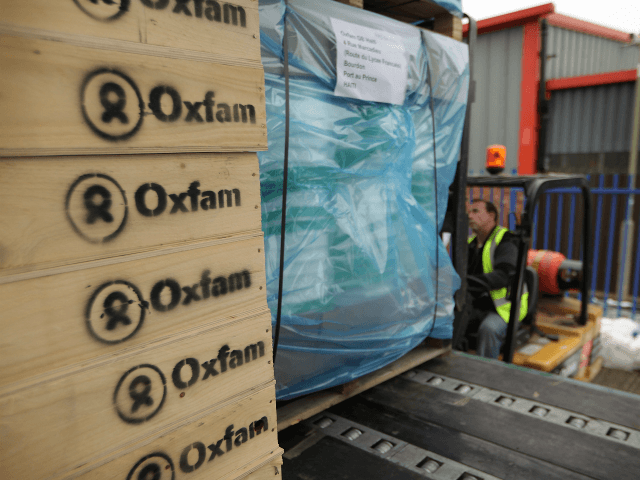The British government has suspended Oxfam from bidding for taxpayers’ cash after the charity confirmed it had suspended two staff amidst an investigation into corruption and sexual misconduct in the Democratic Republic of Congo.
Oxfam had been receiving around £30 million a year in British taxpayers’ cash until it was revealed in 2018 that charity workers had engaged in the sexual exploitation of vulnerable women in Haiti after the devastating 2010 earthquake. Allegations of rape in South Sudan also surfaced that year.
Last week it was revealed that Oxfam was investigating abuse of power, sexual misconduct, and intimidation in the Congo — a month after the government cleared the charity to bid again for public funds after a three-year suspension.
Sources from the Foreign and Commonwealth Office told The Times on Thursday that Oxfam would again be temporarily blocked from accessing funds, pending the outcome of the investigation into the allegations related to the charity’s Congo mission.
A spokesman for the FCO told the newspaper: “All organisations bidding for UK aid must meet the high standards of safeguarding required to keep the people they work with safe.
“Given the most recent reports which call into question Oxfam’s ability to meet those standards, we will not consider any new funding to Oxfam until the issues have been resolved.”
Whistleblowers in the Congo had become concerned that while an independent investigation had been opened in November, it has been six months without any findings. Further, the whistleblowers had said they had been raising their concerns over how the charity was operating since 2015.
In a letter sent to senior figures at Oxfam, former and current employees accused senior staff in the Congo mission of engaging in a “culture of bullying”, including the sexual harassment of female employees and managers having sexual relationships with subordinates.
The mission was also accused of corruption regarding the awarding of contracts for accommodation and travel and the hiring of contractors.
Whistleblowers also said that they had been victims of “threats to their lives and their families’ lives”.
Last week, the charity said: “We can confirm we have suspended two members of Oxfam staff in the DRC as part of an ongoing external investigation, which we set up last November, into allegations of abuses of power, including bullying and sexual misconduct.”
The Times also reported on Thursday that a British official, working for the UN’s peacekeeping mission in the DRC in 2017, who was accused of raping a minor had avoided prosecution, despite alleged compelling evidence against him.
It is claimed that the man had given a 16-year-old girl money and goods for sex. The girl’s mother told Congolese authorities, but after they appeared disinterested in pursuing the case, she contacted the United Nations’ mission in the DRC.
The UN’s Office of Internal Oversight Services investigated the claims and found them to be credible, and the man was dismissed.
The internal affairs unit report stated: “OIOS investigated a report that a staff member raped a 16-year-old Congolese female and, thereafter, continued to sexually abuse the victim by engaging in transactional sex in exchange for money and goods.
“The investigation substantiated the report and further substantiated a $5,000 settlement agreement between the staff member and the minor’s parent.”
The UK’s Ambassador to the UN Dame Barbara Woodward confirmed her office had referred the case to the National Crime Agency — Britain’s version of the FBI — which in turn consulted the Crown Prosecution Service. However, the NCA and CPS decided not to launch an investigation, with The Times saying it was understood to have been difficult for the case to reach the standard of proof needed by UK law.
A spokesman for the NCA told the newspaper: “The referral and available evidence were fully reviewed and the NCA assessed that there was no realistic likelihood of an investigation for an offence under the Sexual Offences Act (2003) meeting the criteria where it could be brought before the prosecutor for a charging decision.”

COMMENTS
Please let us know if you're having issues with commenting.